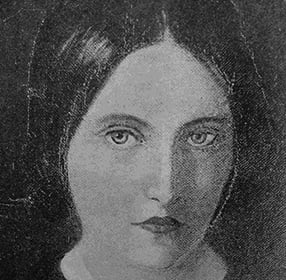I have a friend in ghostland—
Early found, ah me, how early lost!—
Blood-red seaweeds drip along that coastland
By the strong sea wrenched and tossed.
In every creek there slopes a dead man’s islet,
And such an one in every bay;
All unripened in the unended twilight:
For there comes neither night nor day.
Unripe harvest there hath none to reap it
From the watery misty place;
Unripe vineyard there hath none to keep it
In unprofitable space.
Living flocks and herds are nowhere found there;
Only ghosts in flocks and shoals:
Indistinguished hazy ghosts surround there
Meteors whirling on their poles;
Indistinguished hazy ghosts abound there;
Troops, yea swarms, of dead men’s souls.—
Have they towns to live in?—
They have towers and towns from sea to sea;
Of each town the gates are seven;
Of one of these each ghost is free.
Civilians, soldiers, seamen,
Of one town each ghost is free:
They are ghastly men those ghostly freemen:
Such a sight may you not see.—
How know you that your lover
Of death’s tideless waters stoops to drink?—
Me by night doth mouldy darkness cover,
It makes me quake to think:
All night long I feel his presence hover
Thro’ the darkness black as ink.
Without a voice he tells me
The wordless secrets of death’s deep:
If I sleep, his trumpet voice compels me
To stalk forth in my sleep:
If I wake, he hunts me like a nightmare;
I feel my hair stand up, my body creep:
Without light I see a blasting sight there,
See a secret I must keep.
This poem is in the public domain. Published in Poem-a-Day on October 22, 2022, by the Academy of American Poets.
An eight-line fragment from the poem “A Coast-Nightmare” was originally published under the title “A Nightmare (Fragment)” in New Poems by Christina Rossetti: Hitherto Unpublished or Uncollected (Macmillan and Co., 1896), a posthumous volume of Christina Rossetti’s poetry edited by her brother, William Michael Rossetti. As scholar Jasper H. B. De Groot reports in “Christina Rossetti’s ‘A Nightmare’: A Fragment Completed,” published in The Review of English Studies New Series, vol. 24, no. 93 (February 1973), the complete version of the poem and its proper title eventually came to light when a manuscript of the poem in Rossetti’s handwriting was sold at a Sotheby’s auction on February 10, 1970. Critics have tended to discuss the poem’s Gothic elements through a psychological lens, such as Serena Trowbridge, who, in Christina Rossetti’s Gothic (Bloomsbury, 2013), writes that “[t]he interiority of the ghost to the narrator is in no way acknowledged, making this poem, with its Gothic landscapes and ‘indistinguished hazy ghosts’ one of her most inexplicable and terrifying. It is possible, however, to read it with the idea that the narrator may be verging on insanity, perhaps driven mad by a haunted consciousness, or conscience.”

